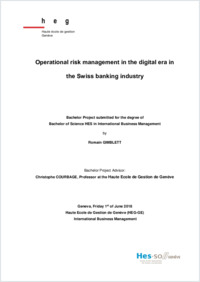Operational risk management in the digital era in the Swiss banking industry
SONAR|HES-SO
- Gimblett, Romain
- Courbage, Christophe (Degree supervisor)
-
2018
Mémoire de bachelor: Haute école de gestion de Genève, 2018
English
This report analyses and attempts to answer the following question: How will digitalization affect operational risks and the management of such risks in the Swiss banking industry? Digitalization will force banks to rethink their business models and to deal with new operational risks. An important condition for an entity to be successful and to survive in the digital era is to manage risks at the perfection. Therefore, it is interesting to analyze how the operational risk management process of banks and the operational risks themselves will be affected by the development of digital technologies. In order to answer our research question, we start by providing information related to the importance of risk management in the banking environment. We then detail the principles of operational risk management established by the Basel Committee on Banking Supervision as well as the requirements for operational risks at banks put in place by the FINMA. The latter give qualitative and quantitative requirements for the operational risk management process. Secondly, we focus on the operational risks within the banking industry. We begin with a detailed review of the four sources of operational risks. We then approach the main operational risks faced by a bank (such as fraud or cyber-attacks) and the processes used to manage these risks. Thirdly, we tackle the digitalization of operational risk management in two steps. We begin by analyzing the impact of digitalization on operational risk and we develop seven key points to digitalize effectively the operational risk management process within a bank. In the second step, we use the data collected in our interviews to put into perspective what we could find in the literature. The purpose here is to have insights from different people in the Swiss financial industry to compare their point of views regarding the impact of digitalization on operational risks and on the operational risk management process. The findings of our interviews are interesting as our interviewees were not having the same point of view on all questions. Only few of them are predicting a change in the operational risks. Nevertheless, all of them are convinced that the operational risk management process will change with digitalization. This paper concludes that the impact of digitalization on operational risks will be moderate. We shouldn’t see any new risks arising. However, we will most probably see a change in the impact or in the probability of occurrence of known risks such as cyber or contagion risks. The impact of digitalization on the operational risk management process will be very important. Automated systems and processes will assist human being on a daily basis by covering the entire departments of the bank and will allow risk managers to take action much quicker than nowadays. Digitalization will play a key role on the upstream part of the process. It will guarantee a more effective mitigation of the potential loss underlying the risk. What will most likely change, according to us, is the profile of an employee working in the risk department. It will be more focused on analytical skills and data science background.
- Language
-
- English
- Classification
- Economics
- Notes
-
- Haute école de gestion Genève
- International Business Management
- hesso:hegge
- License
-
License undefined
- Identifiers
-
- RERO DOC 323525
- Persistent URL
- https://sonar.ch/global/documents/314763
Statistics
Document views: 429
File downloads:
- Mémoire: 2031
